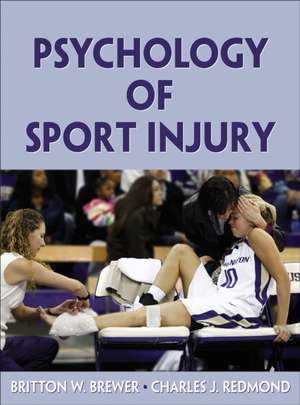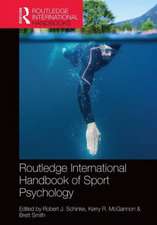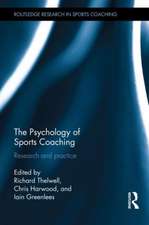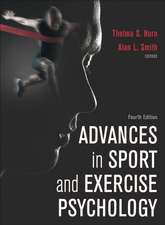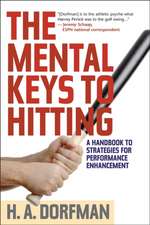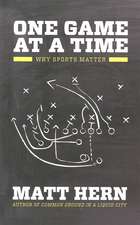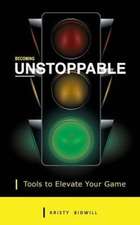Psychology of Sport Injury
Autor Britton W. Brewer, Charles J. Redmonden Limba Engleză Hardback – 5 dec 2016
Preț: 413.41 lei
Preț vechi: 510.38 lei
-19% Nou
79.13€ • 85.98$ • 66.51£
Carte disponibilă
Livrare economică 31 martie-14 aprilie
Livrare express 14-20 martie pentru 51.36 lei
Specificații
ISBN-10: 1450424465
Pagini: 288
Ilustrații: 1 Halftones, black and white; 13 Illustrations, black and white
Dimensiuni: 222 x 286 x 26 mm
Greutate: 1.04 kg
Editura: MG – Human Kinetics
Notă biografică
Britton Brewer is a professor of psychology at Springfield College, where he has taught both graduate and undergraduate courses. He has been conducting research on psychological aspects of sport injury since 1991. He has edited four books on sport psychology as well as authored and coauthored more than 100 journal articles.
Charles Redmond was a professor of exercise science and sport studies at the School of Health, Physical Education and Recreation at Springfield College. He has given presentations and conducted workshops on a variety of topics in sport health care, including the psychology of sport injury.
Descriere
Given the widespread importance of psychological issues in sport injury, it is vital for those working with athletes to be aware of the latest developments on the subject. Written by a sport psychologist and an athletic trainer, Psychology of Sport Injury provides a thorough explanation of the elements and effects of sport injuries along with up-to-date research and insights for practical application. This definitive guide presents sport injury within a broader context of public health and offers insights into the many areas in which psychology may affect athletes.
Cuprins
Chapter 1. Biopsychosocial Foundations of Sport Injury
A Biopsychosocial Perspective on Sport Injury
Biological Foundations of Sport Injury
Psychological Foundations of Sport Injury
Social Foundations of Sport Injury
Biopsychosocial Analysis
Summary
Chapter 2. Antecedents of Sport Injury
Models of Sport Injury Occurrence
Psychosocial Predictors of Sport Injury
Mechanisms of Psychosocial Influence on Sport Injury Occurrence
Biopsychosocial Analysis
Summary
Chapter 3. Sport Injury Prevention
Types of Prevention
Models of Sport Injury Prevention
Sport Injury Prevention Content Categories
Biopsychosocial Analysis
Summary
Part II. Consequences of Sport Injury
Chapter 4. Psychological Responses to Sport Injury
Models of Psychological Response to Sport Injury
Psychological Consequences of Sport Injury
Biopsychosocial Analysis
Summary
Chapter 5. Pain, Sport, and Injury
Definitions of Pain
Types of Pain
Dimensions of Pain
Measurement of Pain
Models and Theories of Pain
Factors Associated with Pain in Sport
Interpreting and Acting on Sport-Related Pain
Biopsychosocial Analysis
Summary
Part III. Rehabilitation of Sport Injury
Chapter 6. Adherence to Sport Injury Prevention and Rehabilitation Programs
Adherence to Sport Injury Prevention Programs
Adherence to Sport Injury Prevention Programs
Consequences of Adherence to Sport Injury Prevention and Rehabilitation Programs
Biopsychosocial Analysis
Summary
Chapter 7. Psychological Factors in Sport Injury Rehabilitation
Sport Injury Rehabilitation Outcomes
Charting a Course from Psychological Factors to Sport Injury Rehabilitation Outcomes
Psychological Readiness to Return to Sport
Biopsychosocial Analysis
Summary
Chapter 8. Psychological Interventions in Sports Health Care
Psychological Interventions in Sports Health Care
Biopsychosocial Analysis
Summary
Part IV. Communication in Sport Injury Management
Chapter 9. Communicating with Patients
Context of Patient-Practitioner Communication in Sports Health Care
Models of the Patient-Practitioner Relationship in Sports Health Care
Congruence of Patient-Practitioner Perceptions in Sports Health Care
Factors Affecting Patient-Practitioner Communication in Sports Health Care
Biopsychosocial Analysis
Summary
Chapter 10. Referring Athletes for Psychological Services
Definition of and Rationale for Referral of Athletes for Psychological Services
Socioclinical Context of Referral of Athletes for Psychological Services
Reasons for Referral
Referral Process
Biopsychosocial Analysis
Summary
